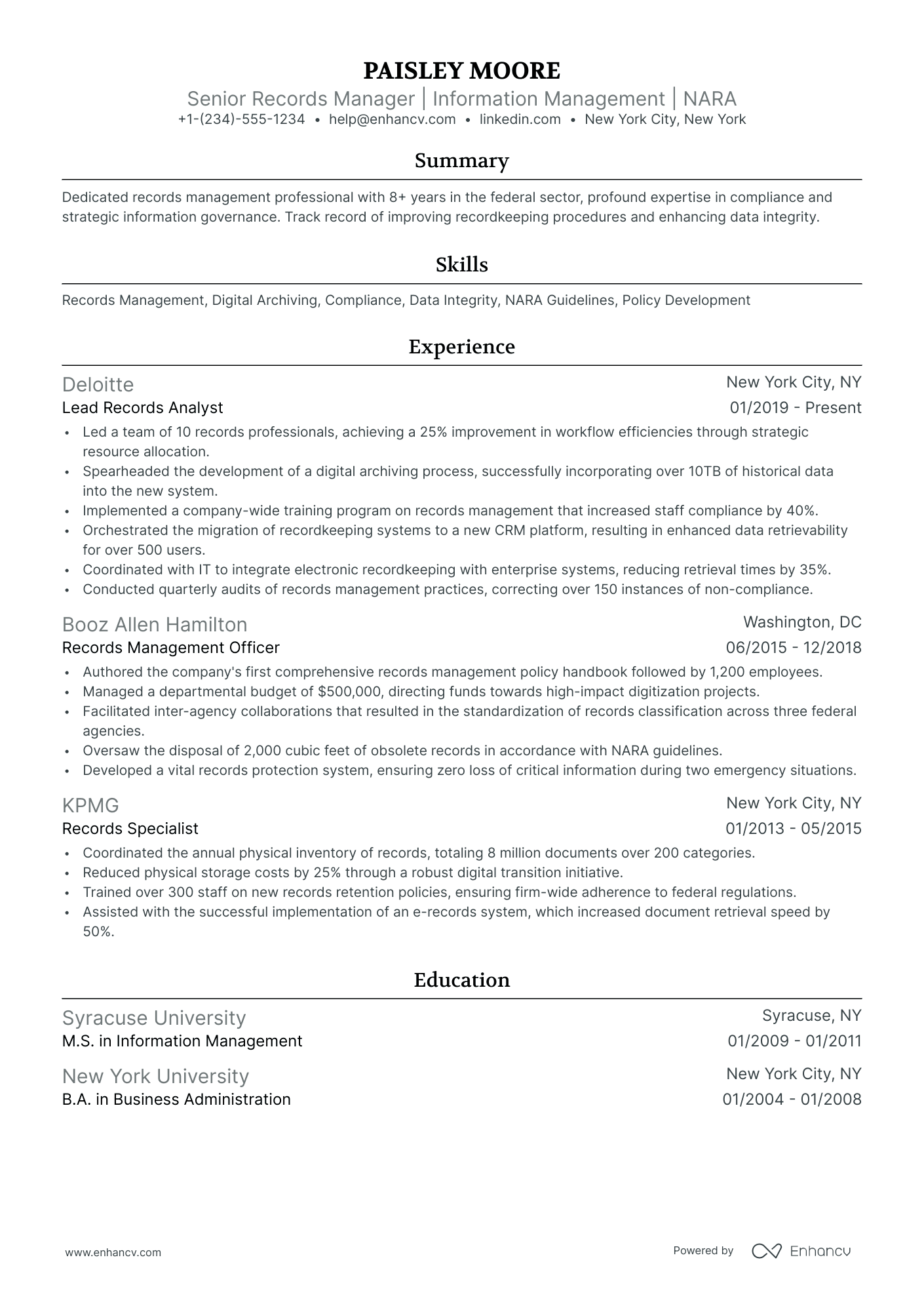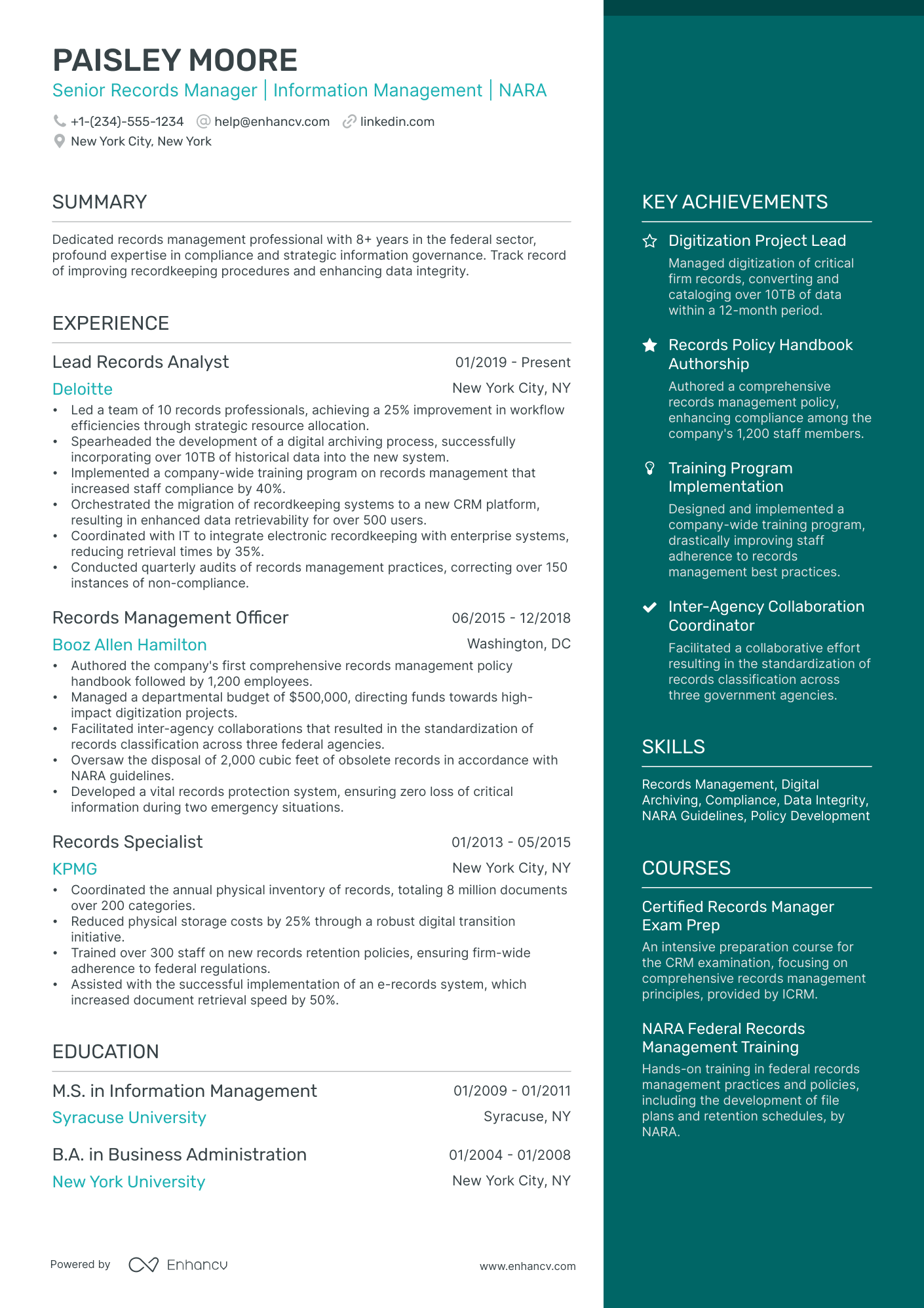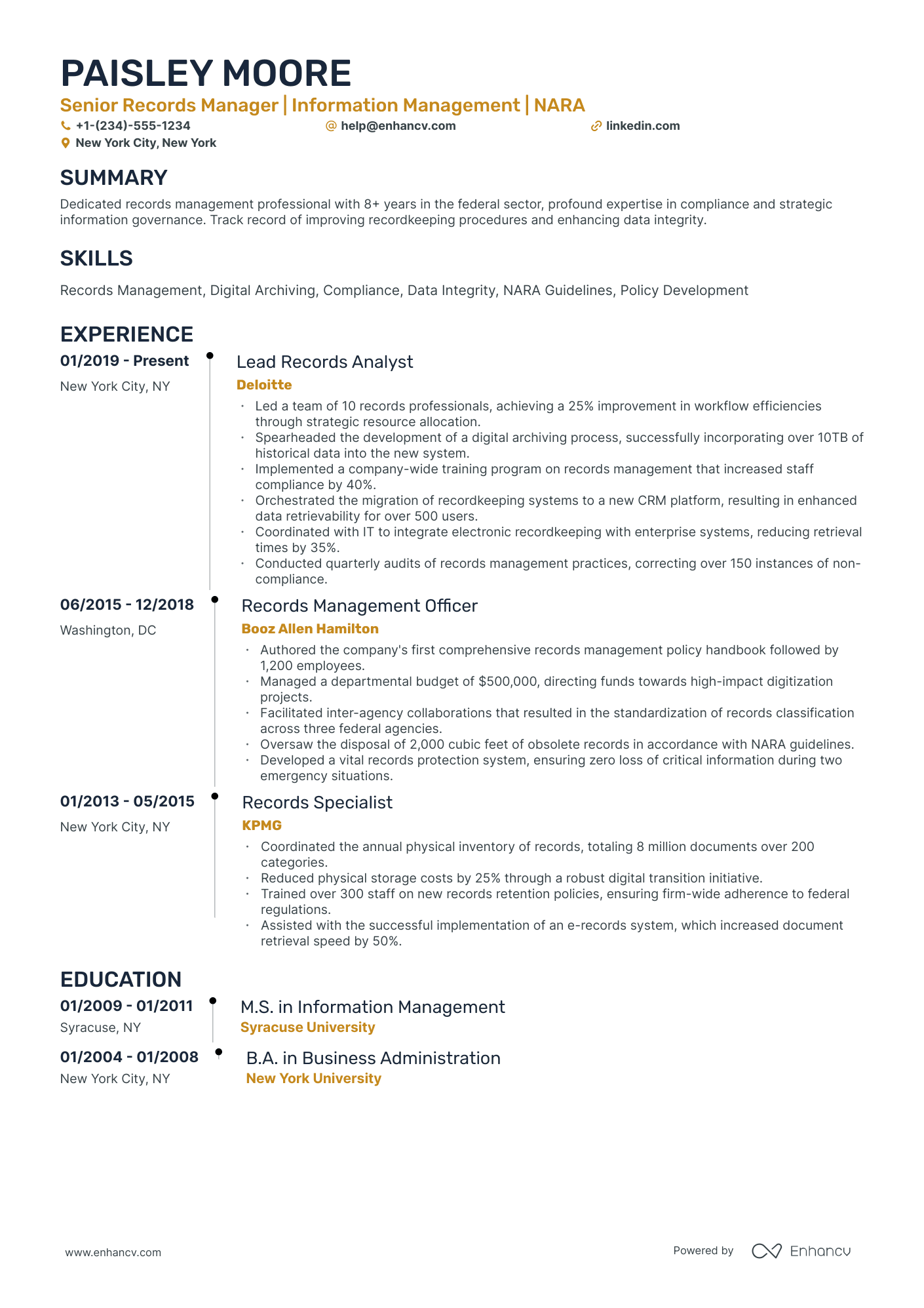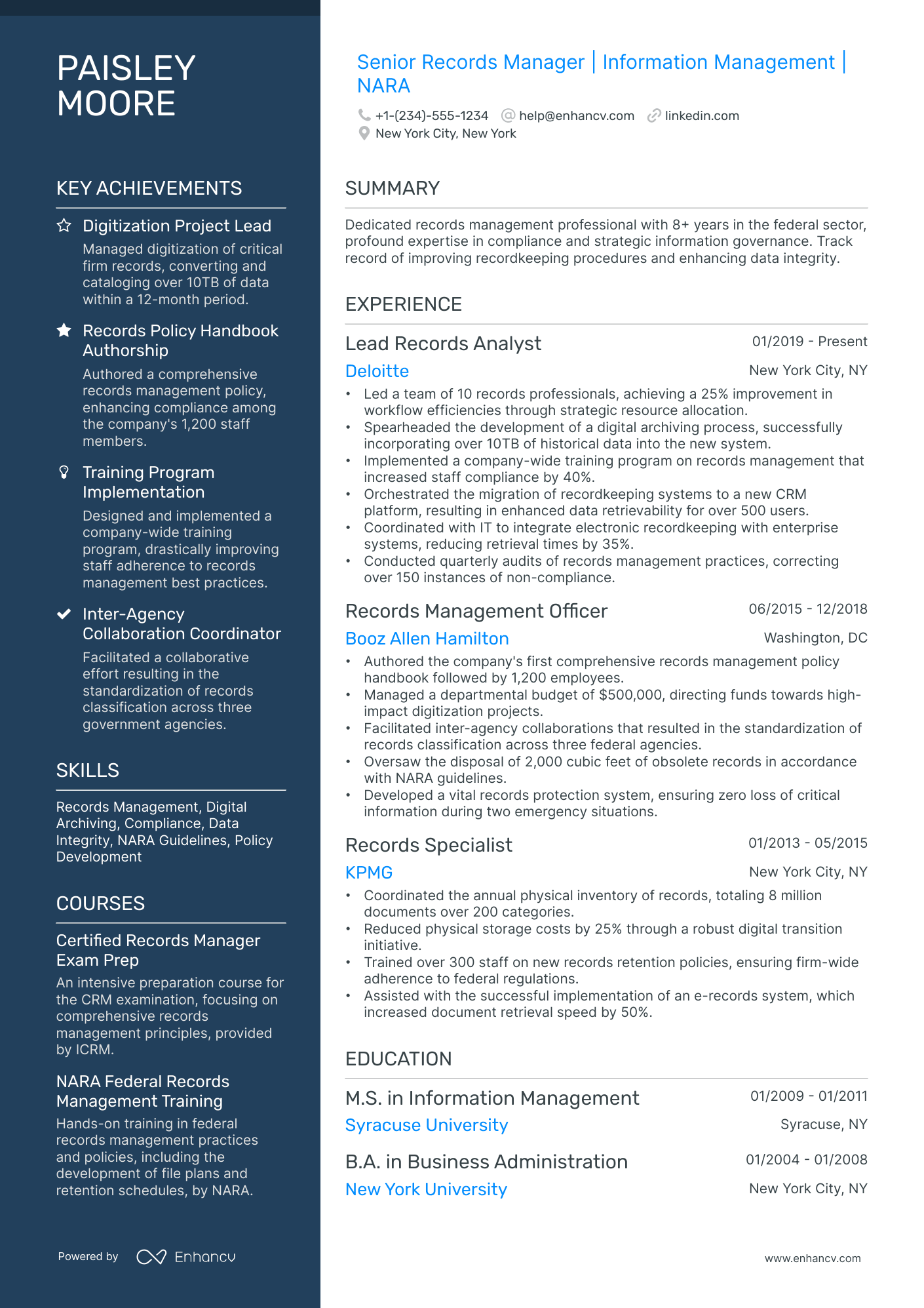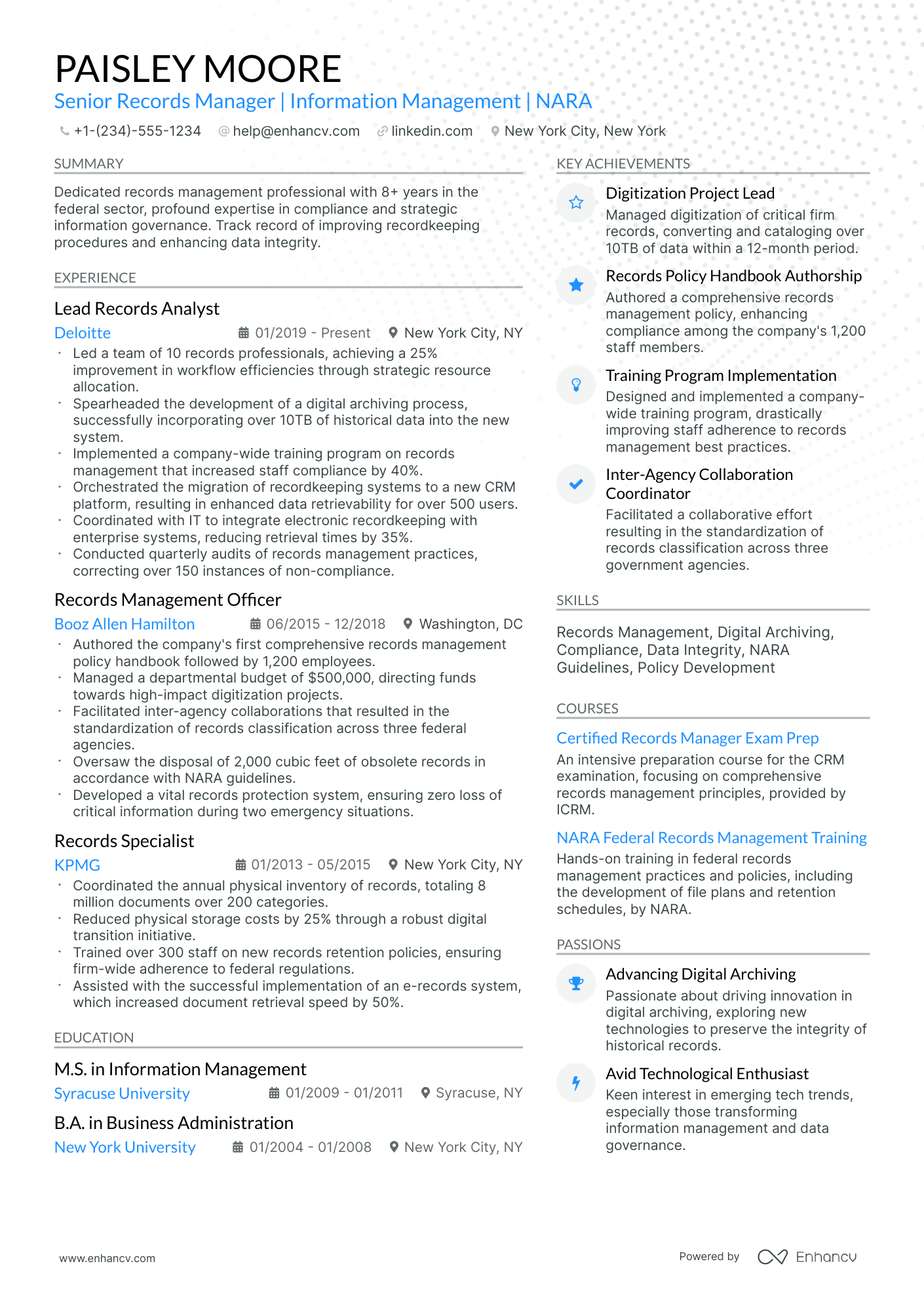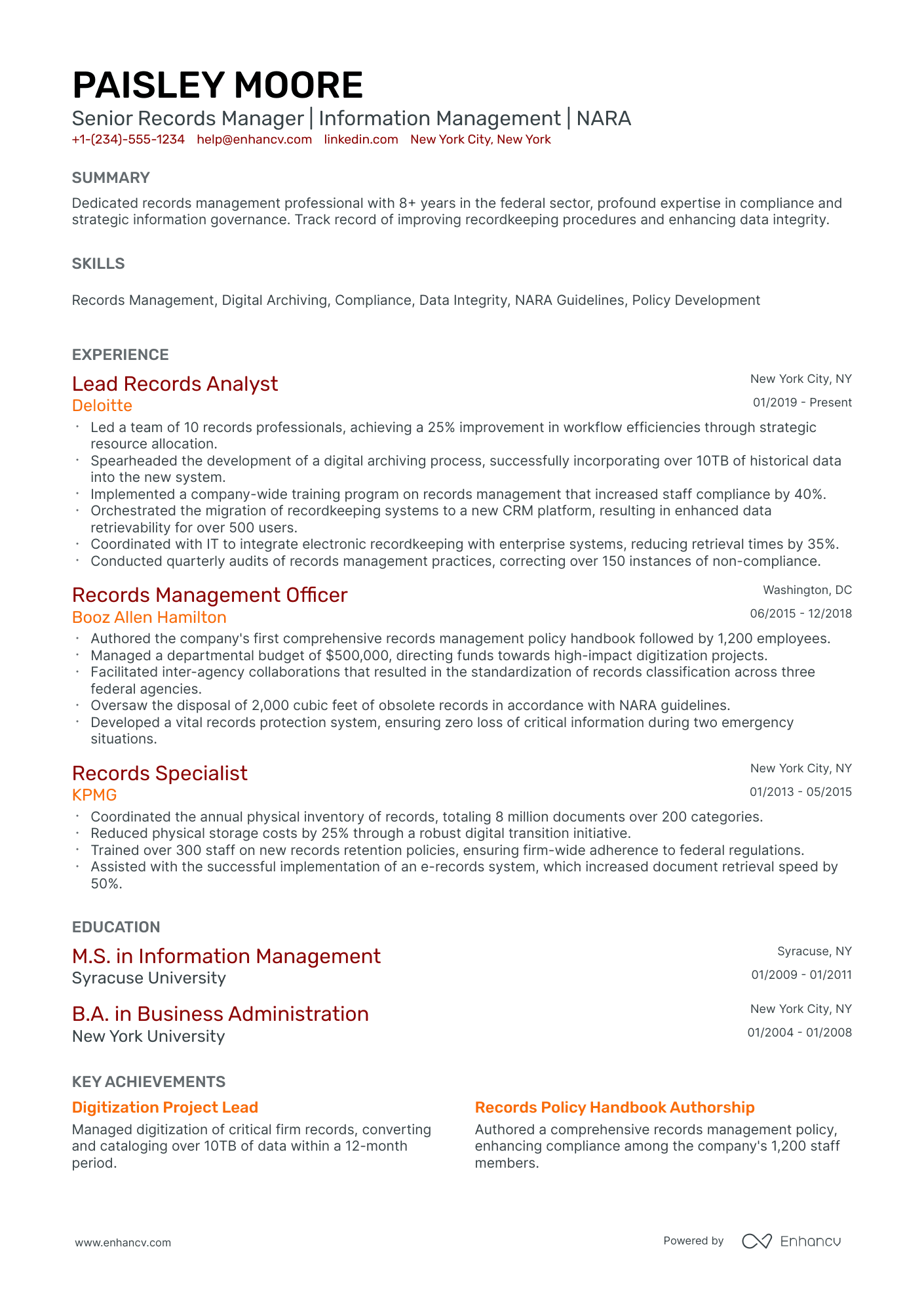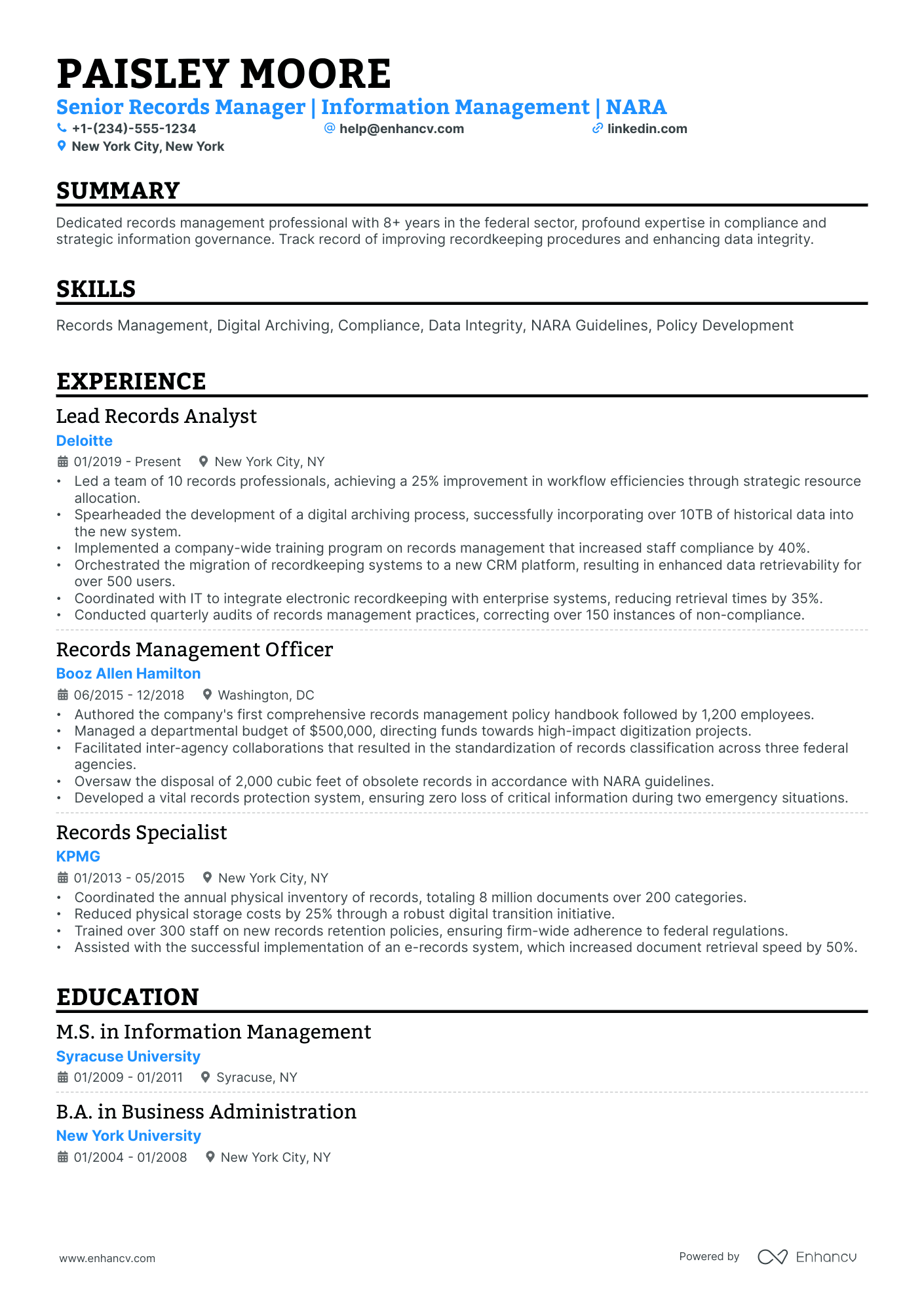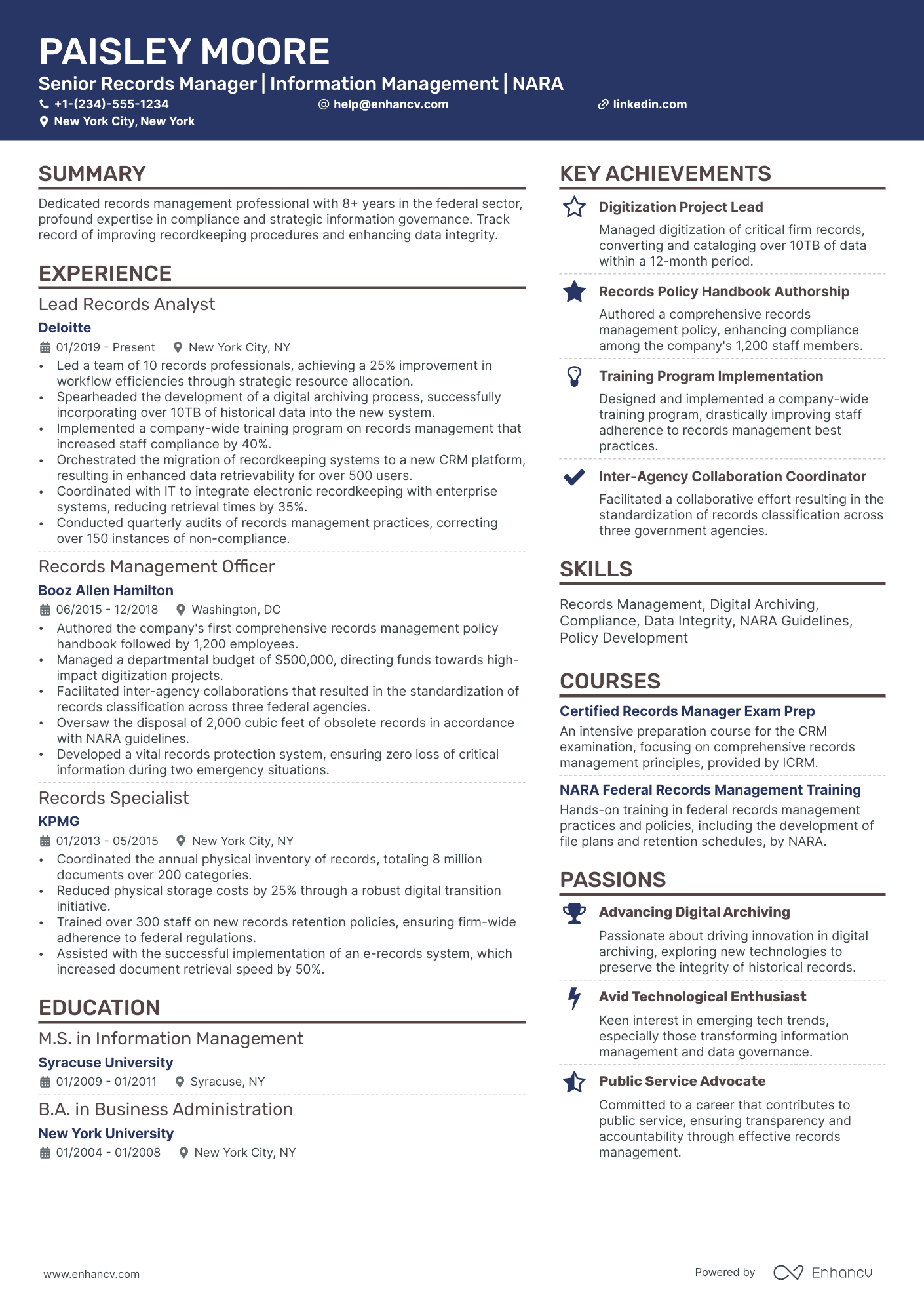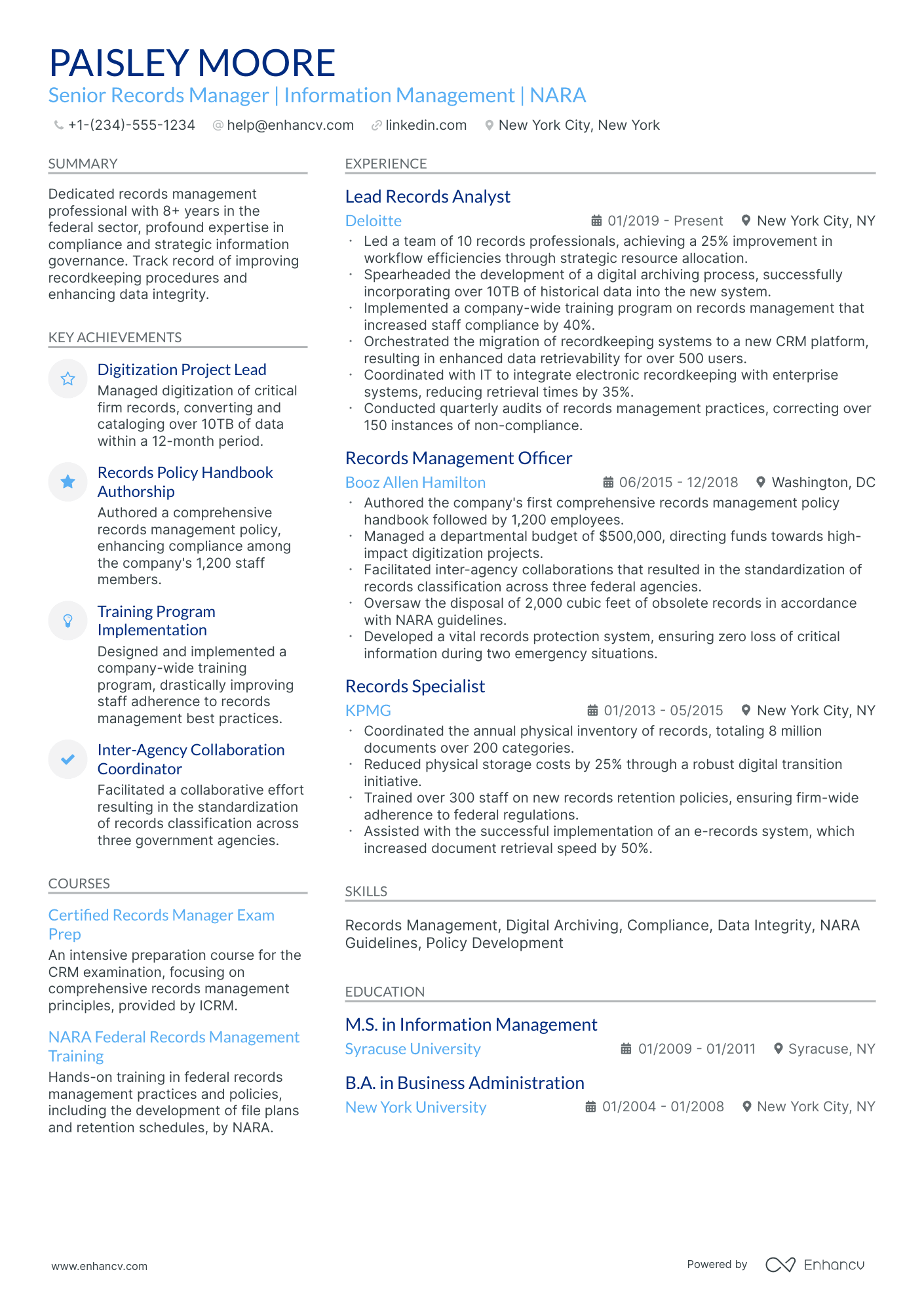Records manager resume submissions often fail because they don't prove governance impact and risk control. Vague descriptions get filtered by ATS keyword gaps and lost in fast recruiter scans. With high competition, unclear compliance value ends interviews early.
A strong resume shows what you improved, not what you used. Knowing how to write a resume that highlights audit readiness gains, retention schedule coverage, reduced retrieval time, lower litigation risk, cleaner metadata accuracy, and on-time disposition volumes across departments is essential. Include measurable scope and results.
Key takeaways
- Quantify every experience bullet with retrieval time, compliance rates, cost savings, or volume managed.
- Tailor resume language to each job posting's specific tools, standards, and compliance frameworks.
- Use reverse-chronological format for experienced candidates and hybrid format for career changers.
- Tie every listed skill to a concrete action and measurable result in your experience section.
- Place certifications above education when they're recent, relevant, or required by the posting.
- Write a three- to four-line summary that leads with years of experience and a standout metric.
- Use Enhancv's tools to tighten bullet phrasing and surface missing keywords before submitting.
Job market snapshot for records managers
We analyzed 81 recent records manager job ads across major US job boards. These numbers help you understand employer expectations, career growth patterns, industry demand at a glance.
What level of experience employers are looking for records managers
| Years of Experience | Percentage found in job ads |
|---|---|
| 1–2 years | 4.9% (4) |
| 3–4 years | 1.2% (1) |
| 5–6 years | 16.0% (13) |
| 9–10 years | 3.7% (3) |
| 10+ years | 6.2% (5) |
| Not specified | 71.6% (58) |
Records manager ads by area of specialization (industry)
| Industry (Area) | Percentage found in job ads |
|---|---|
| Finance & Banking | 35.8% (29) |
| Healthcare | 28.4% (23) |
| Government | 17.3% (14) |
| Education | 13.6% (11) |
Role overview stats
These tables show the most common responsibilities and employment types for records manager roles. Use them to align your resume with what employers expect and to understand how the role is structured across the market.
Day-to-day activities and top responsibilities for a records manager
| Responsibility | Percentage found in job ads |
|---|---|
| Records management | 30.9% (25) |
| Microsoft office | 17.3% (14) |
| Data entry | 14.8% (12) |
| Project management | 12.3% (10) |
| Excel | 11.1% (9) |
| Microsoft office 365 | 11.1% (9) |
| Iron mountain connect | 9.9% (8) |
| Powerpoint | 9.9% (8) |
| Retail banking applications | 9.9% (8) |
| Word | 9.9% (8) |
| Administrative support | 6.2% (5) |
| Filetrail | 6.2% (5) |
Type of employment (remote vs on-site vs hybrid)
| Employment type | Percentage found in job ads |
|---|---|
| On-site | 69.1% (56) |
| Hybrid | 28.4% (23) |
How to format a records manager resume
Recruiters evaluating records manager resumes prioritize evidence of compliance expertise, information governance proficiency, and the ability to manage retention schedules across physical and digital systems. A clean, well-structured resume format ensures these signals—along with relevant certifications and software competencies—surface quickly during both human review and applicant tracking system (ATS) scans.
I have significant experience in this role—which format should I use?
Use a reverse-chronological format to present your records management career in a clear, linear progression that highlights growing responsibility and domain expertise. Do:
- Lead with your most recent role and emphasize scope: volume of records managed, number of departments supported, and oversight of retention policies or compliance audits.
- Feature role-specific tools and frameworks prominently—systems like OpenText, Laserfiche, or IBM FileNet, along with standards such as ISO 15489 or NARA guidelines.
- Quantify outcomes tied to efficiency, risk reduction, or cost savings to demonstrate measurable business impact.
I'm junior or switching into this role—what format works best?
A hybrid format works best, letting you lead with transferable records management skills while supporting them with relevant work or project experience. Do:
- Place a skills section near the top highlighting competencies like document classification, metadata management, digital archiving, or familiarity with records management software.
- Include academic projects, internships, or volunteer work where you organized, cataloged, or maintained information systems—even outside a formal records management title.
- Connect every skill to a specific action and a tangible result so recruiters see practical application, not just a keyword list.
Why not use a functional resume?
A functional format strips away the timeline and context that recruiters need to evaluate how your records management skills were applied in real work environments, making it harder to verify competency depth or career momentum. A functional resume may be acceptable if you're transitioning from a related field like library science, compliance, or administrative management and have no direct records management job titles—but only if every listed skill is tied to a concrete project, system, or measurable outcome rather than presented in isolation.
With your format established, the next step is filling it with the right sections to present your qualifications effectively.
What sections should go on a records manager resume
Recruiters expect to quickly see how you manage records lifecycles, ensure compliance, and improve retrieval, retention, and audit readiness. Understanding which resume sections to include helps you present this information clearly.
Use this structure for maximum clarity:
- Header
- Summary
- Experience
- Skills
- Projects
- Education
- Certifications
- Optional sections: Awards, Publications, Languages
Strong experience bullets should emphasize measurable impact, compliance outcomes, process improvements, system scope, and audit-ready results.
Is your resume good enough?
Drop your resume here or choose a file. PDF & DOCX only. Max 2MB file size.
Now that you’ve organized the key resume components, the next step is writing your records manager experience section so those details translate into clear, role-relevant impact.
How to write your records manager resume experience
Your experience section proves you can manage, organize, and protect records across their full lifecycle—not just describe daily tasks. Hiring managers prioritize demonstrated impact, so every bullet should spotlight delivered outcomes, the records management systems or compliance frameworks you used, and measurable improvements to efficiency, accuracy, or regulatory adherence. Building a targeted resume ensures each entry speaks directly to the role you're pursuing.
Each entry should include:
- Job title
- Company and location (or remote)
- Dates of employment (month and year)
Three to five concise bullet points showing what you owned, how you executed, and what outcomes you delivered:
- Ownership scope: the records programs, retention schedules, digital repositories, classification systems, or departmental archives you were directly accountable for maintaining and improving.
- Execution approach: the records management software, enterprise content management platforms, metadata standards, retention policies, or audit methodologies you applied to organize information and enforce compliance.
- Value improved: the changes you drove in retrieval speed, storage costs, regulatory compliance rates, data accuracy, disaster recovery readiness, or reduction in records-related risk exposure.
- Collaboration context: how you partnered with legal, IT, compliance officers, department heads, or external auditors to align records policies with organizational and regulatory requirements.
- Impact delivered: the concrete results your work produced—expressed through scope of records governed, compliance milestones achieved, operational efficiencies gained, or business continuity improvements realized.
Experience bullet formula
A records manager experience example
✅ Right example - modern, quantified, specific.
Records Manager
Arcadia Health Network | Phoenix, AZ
2021–Present
Multi-site healthcare provider supporting fifteen clinics and two hospitals with regulated patient and corporate records.
- Led an enterprise retention schedule refresh across clinical, HR, and finance records using SharePoint Online, Microsoft Purview, and a file plan—cut legal hold response time by 42% and reduced policy exceptions by 28%.
- Implemented automated classification and disposition workflows in Microsoft Purview and Power Automate for 1.8 million files—reduced manual tagging by 65% and improved audit pass rate from 91% to 99%.
- Standardized metadata, naming conventions, and controlled vocabularies in SharePoint and Excel governance registers—improved search success by 33% and lowered duplicate record creation by 22%.
- Partnered with legal, compliance, and information security to run quarterly eDiscovery and HIPAA readiness drills using Microsoft Purview eDiscovery (Premium)—cut retrieval time from four days to one day and reduced high-risk findings by 30%.
- Trained 240 employees through role-based playbooks and LMS modules, and introduced monthly records stewardship office hours—raised completion to 96% and decreased misfiled records by 18%.
Now that you've seen what a strong experience section looks like, let's break down how to customize yours to match the specific job you're targeting.
How to tailor your records manager resume experience
Recruiters evaluate your records manager resume through both human review and applicant tracking systems (ATS), so tailoring your resume to the job description is essential. Aligning your bullet points with the specific language and priorities in the listing increases your chances of passing both screenings.
Ways to tailor your records manager experience:
- Mirror the exact records management software or systems named in the posting.
- Match the compliance standards or regulatory frameworks the employer references.
- Use the same terminology for retention schedules or disposition processes listed.
- Highlight experience with the specific document classification methods they require.
- Reflect any metrics or performance benchmarks tied to retrieval accuracy.
- Emphasize audit readiness or quality assurance practices when the role demands them.
- Include relevant industry experience such as healthcare legal or government sectors.
- Reference collaboration with departments or stakeholders outlined in the description.
Tailoring means aligning your real accomplishments with each job's stated requirements, not forcing keywords where they don't belong.
Resume tailoring examples for records manager
| Job description excerpt | Untailored | Tailored |
|---|---|---|
| Manage the lifecycle of physical and digital records using OpenText and ensure compliance with NARA federal records schedules. | Handled document management tasks and ensured compliance with company policies. | Managed the full lifecycle of 50,000+ physical and digital records in OpenText, ensuring 100% compliance with NARA federal records schedules across four agency divisions. |
| Develop and implement retention policies aligned with ISO 15489 standards and coordinate annual audits of records disposition logs. | Created filing procedures and helped with audits when needed. | Developed retention policies aligned with ISO 15489 standards and coordinated annual audits of records disposition logs, reducing overdue dispositions by 35% within the first audit cycle. |
| Migrate legacy paper records to an EDRMS platform, training staff on retrieval workflows and metadata tagging protocols. | Assisted with the transition to a new electronic system and trained employees on how to use it. | Led the migration of 120,000 legacy paper records to the agency's EDRMS platform, training 60 staff members on retrieval workflows and metadata tagging protocols—cutting average retrieval time from 12 minutes to under two. |
Once you’ve aligned your experience with the role’s priorities, quantify your records manager achievements to show the measurable impact behind those responsibilities.
How to quantify your records manager achievements
Quantifying your achievements shows how your records work reduces risk and speeds access to information. Track volume handled, retrieval time, compliance results, error rates, and cost savings from retention and digitization improvements.
Quantifying examples for records manager
| Metric | Example |
|---|---|
| Retrieval time | "Cut average record retrieval from 2 days to 4 hours by standardizing file plans and indexing in SharePoint for 12 departments." |
| Compliance rate | "Raised audit compliance from 89% to 98% by updating retention schedules and running quarterly checks across 60,000 records." |
| Backlog reduction | "Eliminated a 14,500-file backlog in 10 weeks by batching intake, using barcode tracking, and setting daily throughput targets." |
| Data quality | "Reduced misfiled records from 3.2% to 0.8% by adding validation steps and training twenty staff on naming conventions." |
| Cost savings | "Saved $48,000 annually by destroying 1,200 boxes per retention policy and renegotiating offsite storage with Iron Mountain." |
Turn your everyday tasks into measurable, recruiter-ready resume bullets in seconds with Enhancv's Bullet Point Generator.
Once you've crafted strong bullet points that highlight your accomplishments, the next step is ensuring your resume also presents the right mix of hard and soft skills that records management employers are looking for.
How to list your hard and soft skills on a records manager resume
Your skills section shows you can protect information, meet retention and privacy requirements, and run reliable records programs—recruiters and ATS scan this section for role keywords, so aim for a balanced mix of hard skills and job-specific soft skills.
records manager roles require a blend of:
- Product strategy and discovery skills.
- Data, analytics, and experimentation skills.
- Delivery, execution, and go-to-market discipline.
- Soft skills.
Your skills section should be:
- Scannable (bullet-style grouping).
- Relevant to the job post.
- Backed by proof in experience bullets.
- Updated with current tools.
Place your skills section:
- Above experience if you're junior or switching careers.
- Below experience if you're mid/senior with strong achievements.
Hard skills
- Records retention schedules
- Records classification taxonomies
- Electronic records management systems
- Microsoft SharePoint, Microsoft 365 Purview
- OpenText Content Suite, Documentum
- Legal holds and eDiscovery
- Information governance programs
- Privacy compliance: GDPR, HIPAA
- ISO 15489 records management
- Metadata standards and indexing
- Digitization and imaging workflows
- Audit readiness and documentation
Soft skills
- Translate regulations into procedures
- Partner with legal and compliance
- Run stakeholder intake interviews
- Write clear governance documentation
- Train users on retention practices
- Enforce standards with diplomacy
- Triage and resolve escalations
- Prioritize high-risk records issues
- Lead change management rollouts
- Maintain strict confidentiality
- Communicate audit findings clearly
- Track follow-through to closure
How to show your records manager skills in context
Skills shouldn't live only in a bulleted list on your resume. Explore resume skills examples to see how top candidates weave competencies into every section.
They should be demonstrated in:
- Your summary (high-level professional identity)
- Your experience (proof through outcomes)
Here's what strong records manager entries look like in practice.
Summary example
Records manager with 12 years of experience in healthcare compliance, skilled in ERMS platforms, retention scheduling, and HIPAA-aligned disposition workflows. Led a system migration that cut retrieval times by 40%. Known for cross-departmental training and audit readiness.
- Signals senior-level experience immediately
- Names industry-specific tools and methods
- Includes a concrete, measurable outcome
- Highlights training as a soft skill
Experience example
Senior Records Manager
Allegheny Health Partners | Pittsburgh, PA
June 2018–March 2024
- Migrated 2.1 million legacy files to OpenText, reducing retrieval time by 40% across six departments.
- Partnered with legal and compliance teams to redesign retention schedules, achieving 100% audit pass rates over three years.
- Built and delivered quarterly training for 80+ staff on records classification using ISO 15489 standards.
- Every bullet contains measurable proof.
- Skills surface naturally through real outcomes.
Once you’ve tied your records management strengths to real outcomes and responsibilities, the next step is applying that same approach to building a records manager resume when you don’t have formal experience.
How do I write a records manager resume with no experience
Even without full-time experience, you can demonstrate readiness through projects and transferable work. Learn how to build a resume without work experience that still proves your value to hiring managers.
- Internship in records management office
- Volunteer archive digitization and indexing
- Document control support for projects
- Freedom of Information Act requests
- File audits and retention reviews
- Electronic filing system cleanup
- Coursework in records management standards
- Student job in registrar's office
Focus on:
- Retention schedules and compliance evidence
- Metadata, indexing, and taxonomy work
- Electronic document management systems use
- Audit-ready tracking and reporting
Resume format tip for entry-level records manager
Use a hybrid resume format because it highlights skills and projects first, while still showing work history and education clearly. Do:
- Add a "Projects" section with outcomes.
- List tools: Microsoft SharePoint, Excel, Adobe Acrobat.
- Name standards used: ISO 15489.
- Quantify volume, time saved, error reduction.
- Match keywords to the job description.
- Cleaned up a Microsoft SharePoint file library, applied a consistent metadata schema, and reduced duplicate records by 28% across 1,200 files.
Even without direct experience, your education section can demonstrate the foundational knowledge and relevant coursework that qualify you for a records manager role.
How to list your education on a records manager resume
Your education section helps hiring teams confirm you have the foundational knowledge needed for records management. It validates your training in information governance, compliance, and organizational systems.
Include:
- Degree name
- Institution
- Location
- Graduation year
- Relevant coursework (for juniors or entry-level candidates)
- Honors & GPA (if 3.5 or higher)
Omit month and day details—list the graduation year only.
Here's a strong education entry tailored to a records manager resume.
Example education entry
Bachelor of Science in Information Science
University of Wisconsin–Milwaukee, Milwaukee, WI
Graduated 2020
GPA: 3.7/4.0
- Relevant Coursework: Records and Information Management, Archival Theory, Database Systems, Digital Preservation
- Honors: Dean's List (six consecutive semesters), Magna Cum Laude
How to list your certifications on a records manager resume
Certifications on your resume show a records manager's commitment to ongoing learning, proficiency with records tools and standards, and alignment with current compliance and governance expectations.
Include:
- Certificate name
- Issuing organization
- Year
- Optional: credential ID or URL
- Place certifications below education when they're older, less relevant, or you want your degree to lead for the role.
- Place certifications above education when they're recent, highly relevant, or required for the job posting.
Best certifications for your records manager resume
- Certified Records Manager (CRM)
- Information Governance Professional (IGP)
- Certified Information Professional (CIP)
- ISO 15489 Records Management Certification
- Certified Data Privacy Solutions Engineer (CDPSE)
- Project Management Professional (PMP)
- ITIL 4 Foundation
Once you’ve positioned your credentials where hiring teams can quickly verify them, turn to your records manager resume summary to tie those qualifications to the value you deliver.
How to write your records manager resume summary
Your resume summary is the first thing a recruiter reads, so it needs to earn their attention fast. A strong opening frames your records management expertise and sets the tone for everything that follows.
Keep it to three to four lines, with:
- Your title and total years of experience in records or information management.
- The industries or domains where you've managed records systems.
- Core tools and skills like EDMS platforms, retention scheduling, or compliance frameworks.
- One or two measurable achievements that prove your impact.
- Soft skills tied to real outcomes, such as cross-department coordination or staff training.
PRO TIP
At a mid-level records manager role, emphasize hands-on system expertise and measurable process improvements. Highlight compliance results, audit outcomes, or efficiency gains you drove directly. Avoid vague phrases like "detail-oriented professional" or "passionate about organization." Recruiters want proof, not personality descriptors.
Example summary for a records manager
Records manager with six years of experience overseeing enterprise document lifecycle in healthcare. Reduced retrieval times by 35% after migrating 200,000+ files to OpenText. Skilled in retention compliance and cross-departmental training.
Optimize your resume summary and objective for ATS
Drop your resume here or choose a file.
PDF & DOCX only. Max 2MB file size.
Now that your summary is ready to capture a hiring manager's attention, make sure the header above it presents your contact details clearly and professionally.
What to include in a records manager resume header
A resume header lists your key identifiers and contact details, helping a records manager stay visible, credible, and easy to screen in recruiter systems.
Essential resume header elements
- Full name
- Tailored job title and headline
- Location
- Phone number
- Professional email
- GitHub link
- Portfolio link
A LinkedIn link helps recruiters verify experience quickly and supports screening.
Do not include a photo on a records manager resume unless the role is explicitly front-facing or appearance-dependent.
Keep the header to one or two lines, match your job title to the posting, and use consistent formatting across your resume and LinkedIn.
Example
Records manager resume header
Jordan Taylor
Records manager | Records retention, compliance, and information governance
Chicago, IL
(312) 555-01XX | your.name@enhancv.com | github.com/yourname | yourwebsite.com | linkedin.com/in/yourname
Once your contact details and role identifiers are in place at the top, use the next section to add optional resume sections that strengthen your records manager application.
Additional sections for records manager resumes
Adding extra sections helps you stand out when your core qualifications match other candidates, especially by showcasing role-specific credibility and niche expertise. For example, listing language skills on your resume can set you apart in organizations managing multilingual records or operating across regions.
- Languages
- Certifications and licenses
- Professional affiliations
- Publications
- Volunteer experience
- Continuing education
- Awards and recognition
Once you've strengthened your resume with relevant additional sections, pairing it with a well-crafted cover letter can further set your application apart.
Do records manager resumes need a cover letter
A cover letter isn't required for a records manager, but it helps in competitive searches or when hiring managers expect one. If you're unsure where to start, understanding what a cover letter is and how it complements your resume can clarify when one adds real value. It can make a difference when your resume needs context, or when the role demands close cross-functional work.
Use these tips to decide when to include one:
- Explain role and team fit by mapping your experience to governance needs, audit readiness, and how you partner with legal, HR, and information technology.
- Highlight one or two projects with outcomes, such as reducing retrieval time, improving retention compliance, or passing an audit with fewer findings.
- Show you understand the business context by referencing the records lifecycle, key users, and the risks tied to privacy, litigation holds, and regulatory deadlines.
- Address transitions or non-obvious experience by connecting adjacent work, like compliance, privacy, or operations, to records manager responsibilities.
Drop your resume here or choose a file.
PDF & DOCX only. Max 2MB file size.
Once you’ve decided whether to include a cover letter to strengthen your application, you can use AI to improve your records manager resume and sharpen the details employers review first.
Using AI to improve your records manager resume
AI can sharpen your resume's clarity, structure, and impact. It helps tighten language and highlight relevant achievements. But overuse strips authenticity. Once your content is clear and aligned with the records manager role, step away from AI. For specific guidance, explore ChatGPT resume writing prompts tailored to different resume sections.
Here are 10 practical prompts to strengthen specific sections of your records manager resume:
- Strengthen your summary. "Rewrite my records manager resume summary to emphasize compliance expertise and measurable efficiency gains in two to three sentences."
- Quantify experience bullets. "Add specific metrics to these records manager experience bullets, focusing on volume managed, error reduction, or time saved."
- Align skills to the job. "Compare my listed skills against this records manager job description and suggest missing keywords I should add."
- Tighten bullet phrasing. "Shorten each of my records manager experience bullets to one concise line using strong action verbs."
- Clarify project impact. "Rewrite this records manager project description to clearly state the problem, my role, and the measurable outcome."
- Improve certification relevance. "Reorder and describe my certifications to highlight those most relevant to a records manager position."
- Remove vague language. "Identify and replace vague words in my records manager resume with specific, concrete alternatives."
- Refine education details. "Rewrite my education section to emphasize coursework and achievements directly relevant to records manager responsibilities."
- Target industry language. "Adjust my records manager experience section to reflect terminology used in this specific job posting."
- Audit for consistency. "Review my entire records manager resume for inconsistent tense, formatting errors, and misaligned dates."
Stop using AI once your resume sounds accurate, specific, and true to your real experience. AI should never invent experience or inflate claims—if it didn't happen, it doesn't belong here.
Conclusion
A strong records manager resume proves impact with measurable outcomes, role-specific skills, and a clear structure. Highlight retention and disposition results, audit readiness, risk reduction, and process improvements. Keep your experience easy to scan, with consistent headings and focused bullet points.
This approach shows you’re ready for today’s hiring market and near-future needs. It signals you can protect information, meet compliance requirements, and support efficient operations. With clear results and relevant skills, your records manager resume will stand up to fast reviews.
